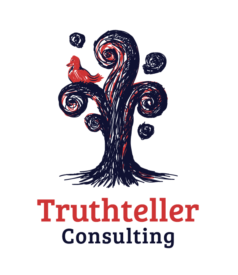When I was packing up my house in Portland Oregon, in 2018, I became acutely aware that I would need to find community and connection when I reached the East Coast. In looking at some events in Connecticut, I came across a post for a narrative storytelling class run by Terry Wolfisch Cole at Tell Me Another. I signed up and after participating, I did three stories in front of live audiences. Two of them were recorded and you can find them at the end of this page.
It is terrifying and empowering to do this. It also begs the question– What is ok to share? While not every story needs to be deeply emotional, there does need to be a journey or a change that is worth hearing about. Terry’s advice, which she learned from, Matthew Dicks of Speak Up, goes something like this–“Show them your scars, not open wounds.”
For me, the process of pulling a story together is as important as the performance. At any given time, I am thinking of a lot at once. This lets me make connections between all sorts of things and I think it has let me be very good at solving hard problems. However, with painful or personal things it can be hard for me to figure out what the story is. What really happened? What has changed because something happened? Getting a story ready to share, without notes, on a stage with a microphone, in front of an audience forces clarity. This might not be everyone’s medicine but it has helped me a lot.
In public health we are always challenged to help folks understand what we do. We talk a lot about data, the evidence-base, strategies, plans. . . We can do better when we work with communities to humanize data and share personal stories that show how policies and practices impact people’s lives. Using stories in community work can support people to name their truth. A great example is the work of #IAMNOTAVIRUS. This group has centered the needs and strengths of the Asian Diaspora and has done some impactful work to push back on the racism that this population has suffered during the Covid19 pandemic.
I love to talk with people about storytelling. I have sent more than a few people to Terry but I have also included these strategies in my own work.
After doing some training with StoryCenter, I began creating audio stories or podcasts as way to share the work that social justice organizations are doing in Southeastern Connecticut. I fell in love with audio editing and producing. You can see some of my work under the TruthtellerPOD tab of this website.
If you want to talk about storytelling please reach out!
May 1, 2020 Tell Me Another–Hand on Hartford Benefit– on Zoom
September 28, 2019 Tell Me Another–Adulting– at the Hartford Flavor Company *Trigger Warning: Mental Illness
